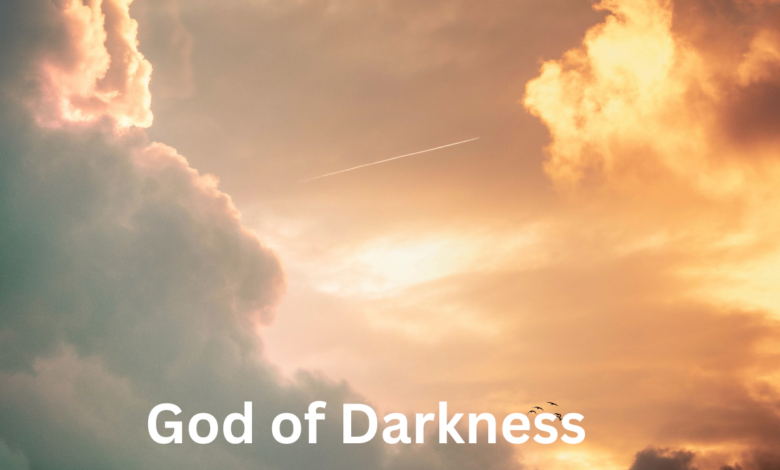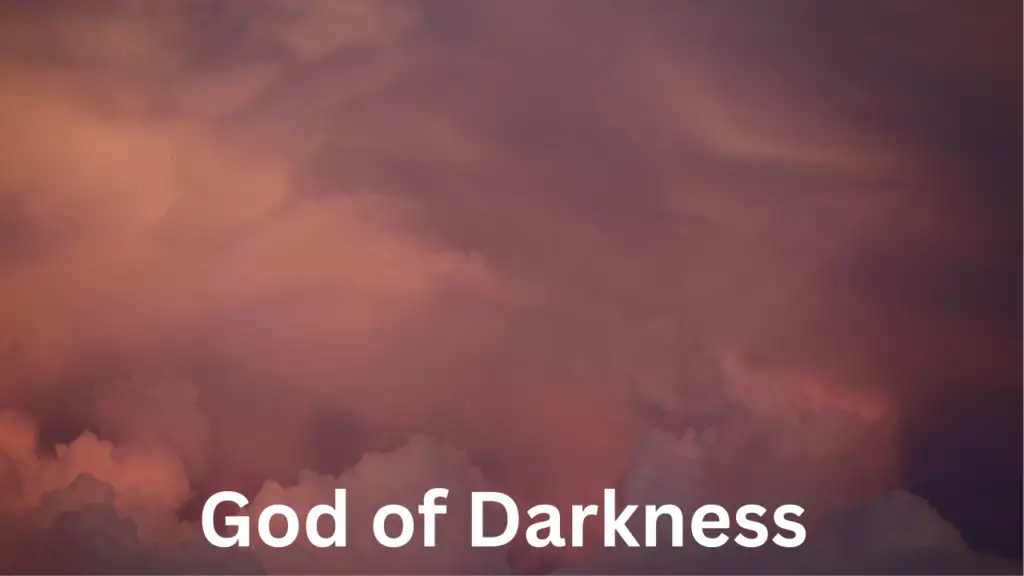God of Darkness : Dark Lord
Embracing the Shadows: Unveiling the Mysteries of the God of Darkness

God of Darkness

- Deity Meaning | Specific Qualities | Connection | 2023
- Christian Holidays | Exploring Christian Festivals
- What Does Hell look like? | 2023 |
Introduction
In the realm of mythology and religious pantheons, the concept of a God of Darkness has captivated the human imagination for centuries. Often juxtaposed with deities symbolizing light and goodness, the God of Darkness represents a mysterious and complex figure that delves into the depths of the human psyche and the balance of cosmic forces. This article endeavors to explore the multifaceted nature of the God of Darkness, tracing its appearances in various mythologies, its symbolic significance, and its relevance in contemporary culture.
Mythological Encounters
Across cultures and civilizations, the motif of a God of Darkness has emerged, signifying the duality of existence. In Norse mythology, the deity known as Loki embodies not only the trickster archetype but also possesses attributes associated with darkness. Loki’s cunning and enigmatic nature, as well as his connection to chaos, make him a prime representative of the God of Darkness.
In Egyptian mythology, Anubis, the jackal-headed god, is often associated with death and the underworld. He guides souls through the afterlife, symbolizing the journey from light into darkness—a transition that echoes the cyclical nature of life itself.
Hinduism introduces Kali, the fearsome goddess of destruction and time, who wears a garland of skulls and is often depicted in a dark and wrathful form. Kali’s paradoxical role as both a destructive force and a protective mother highlights the intricate relationship between darkness and creation.
Symbolism and Significance
The God of Darkness, while seemingly antithetical to notions of light and purity, embodies profound symbolic meaning. Darkness, in this context, represents the unknown, the hidden, and the unconscious aspects of existence. It serves as a reminder that life’s mysteries cannot be fully illuminated by light alone; embracing the darkness within and around us is essential for comprehensive self-awareness.
Furthermore, the God of Darkness embodies balance. Just as day gives way to night, and life eventually succumbs to death, the interplay between light and darkness sustains the cosmic equilibrium. This balance is integral to the universe’s functioning, serving as a testament to the cyclical nature of existence and the necessity of embracing all facets of life.
Cultural Relevance
In modern times, the concept of the God of Darkness has found its way into literature, film, and popular culture. Contemporary authors often draw inspiration from ancient myths, reimagining the God of Darkness as a complex character who challenges conventional notions of good and evil. This trend reflects society’s growing interest in exploring the intricate aspects of human nature and the shades of gray that exist between black and white.
Moreover, the God of Darkness serves as a lens through which we examine our fears, insecurities, and the unknown. As humanity grapples with the uncertainties of the future and the complexities of moral dilemmas, the archetype of the God of Darkness resonates deeply. It reminds us that confronting our inner darkness and acknowledging the shadows within us is a crucial step towards personal growth and understanding.
Conclusion
The God of Darkness, a recurring and enigmatic figure in mythology, invites us to explore the depths of our existence and the cosmos. Far from representing malevolence, this deity embodies the intricate balance between light and dark, creation and destruction, and the known and the unknown. As we continue to navigate the complexities of life, embracing the wisdom of the God of Darkness can lead to a richer understanding of ourselves, our world, and the mysteries that lie beyond the light.
Who is the ‘God of Darkness’?
The God of Darkness is a mythological deity often found in various cultures and pantheons. This deity symbolizes the hidden, mysterious, and often unconscious aspects of existence, embodying the balance between light and darkness.
What is the significance of the God of Darkness?
The God of Darkness holds symbolic significance, representing the unknown, the subconscious, and the cyclical nature of life. This deity teaches us the importance of embracing all facets of life, even those that are not immediately illuminated.
Which mythologies feature a God of Darkness?
The God of Darkness appears in various mythologies. For instance, in Norse mythology, Loki is associated with darkness and chaos. In Egyptian mythology, Anubis guides souls through the afterlife. In Hinduism, Kali is a fearsome goddess of destruction and time.
Is the God of Darkness a malevolent deity?
Not necessarily. While darkness is often associated with negativity, the God of Darkness represents a balance rather than pure malevolence. This deity reflects the idea that darkness is an essential part of the cosmic equilibrium and personal growth.
What does the God of Darkness symbolize in terms of duality?
The God of Darkness embodies the dual nature of existence. It emphasizes that light and darkness, creation and destruction, life and death are interconnected and necessary for the harmonious functioning of the universe.
How is the God of Darkness relevant in modern culture?
The concept of the God of Darkness is relevant in literature, films, and contemporary art. It serves as a tool to explore complex characters, challenge traditional notions of good and evil, and delve into the depths of human psychology.
What lessons can we learn from the God of Darkness?
The God of Darkness teaches us to confront our fears, embrace the unknown, and acknowledge our inner shadows. By doing so, we gain a deeper understanding of ourselves and the world around us.
How does the God of Darkness impact our understanding of balance?
The God of Darkness showcases the importance of balance in the universe. Just as day turns into night, the interplay between light and darkness maintains cosmic equilibrium, reminding us that both aspects are necessary for growth and harmony.
What role does the God of Darkness play in personal growth?
Embracing the God of Darkness archetype encourages self-exploration and self-acceptance. By acknowledging our own darkness, we can undergo personal transformation and achieve a more holistic sense of identity.
How can the concept of the God of Darkness be applied to spirituality?
Spiritually, the God of Darkness can remind us that enlightenment doesn’t come solely from seeking the light. Exploring our inner darkness and facing challenges head-on can lead to profound growth and spiritual development.





